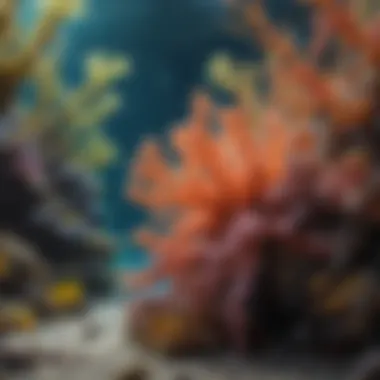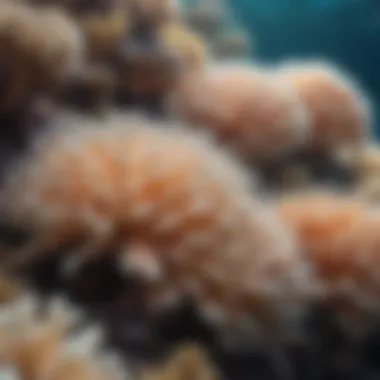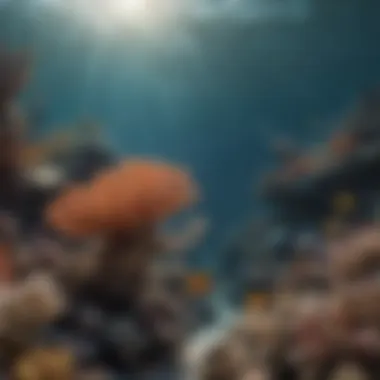Unveiling the Enchanting Mysteries of Coral Reefs


Equipment and Gear
When embarking on a journey to explore the wonders of coral reefs, having the right equipment and gear is essential to ensure a safe and fulfilling experience. From snorkeling gear to underwater cameras, each piece plays a crucial role in enhancing your underwater adventure. Start with a high-quality snorkel set, including a mask, snorkel, and fins, to immerse yourself in the colorful world beneath the waves. Make sure to choose gear made from durable materials to withstand the marine environment. Additionally, consider investing in an underwater camera to capture the mesmerizing beauty of coral reefs in high resolution. Brands like GoPro and Seac offer top-of-the-line waterproof cameras ideal for capturing vibrant marine life.
Techniques and Training
Mastering the techniques and skills required to navigate coral reefs is paramount for a successful exploration. Learning how to snorkel efficiently, maneuver through narrow pathways, and identify different coral species will amplify your experience. Engage in training exercises designed to enhance your swimming endurance and breath-holding capacity, essential for prolonged periods underwater. Seek guidance from experienced divers and marine biologists to deepen your understanding of coral reef ecosystems. By honing your skills and knowledge, you can truly appreciate the intricate beauty of these marine marvels.
Safety and Risk Management
While immersing yourself in the underwater realm of coral reefs, prioritizing safety and risk management is non-negotiable. Familiarize yourself with potential hazards such as strong currents, marine wildlife encounters, and sharp coral formations. Equip yourself with protective gear like reef-safe sunscreen to prevent harmful UV exposure and proper diving attire to avoid jellyfish stings. Stay abreast of weather conditions and always dive with a buddy to ensure mutual support and assistance in case of emergencies. Implementing rigorous safety protocols and risk mitigation strategies will guarantee a secure exploration of coral reefs.
Events and Competitions
Participating in coral reef conservation events and competitions can enrich your understanding of these delicate ecosystems. Join marine conservation organizations that host reef cleanup initiatives, raising awareness about the importance of preserving coral reefs. Attend underwater photography contests focused on capturing the beauty of coral reefs, showcasing your skills while advocating for marine conservation. Engage in snorkeling competitions that test your agility and underwater navigation abilities, connecting with like-minded individuals passionate about marine life protection. By actively participating in coral reef-related events and competitions, you contribute to promoting the conservation of these invaluable marine ecosystems.
Lifestyle and Community


The coral reef exploration journey not only entails underwater adventures but also encompasses a lifestyle shaped by a profound appreciation for marine biodiversity. Cultivate a sustainable lifestyle by minimizing plastic usage and supporting eco-conscious brands that advocate for marine conservation. Connect with a community of ocean lovers who share your passion for protecting coral reefs and marine life. Balance your extreme sports pursuits with mindfulness practices to foster mental well-being and a harmonious lifestyle. Embrace a holistic approach to coral reef exploration that transcends mere adventure, celebrating the intricate connection between humans and the marine world.
Introduction to Coral Reefs
Coral reefs are complex and vibrant ecosystems that play a crucial role in supporting marine life and protecting coastlines. In this section, we will explore the fundamental aspects that make coral reefs unique and essential for our planet's health. Understanding the formation, biodiversity, and ecological significance of coral reefs is vital to appreciating the intricate balance they maintain within their underwater habitats.
Definition of Coral Reefs
Coral reefs are intricate structures formed by the accumulation of calcium carbonate secreted by coral polyps. This meticulous process creates underwater havens teeming with life and color. The calcium carbonate serves as a sturdy foundation for coral growth, providing a habitat for a diverse array of marine species. The resilience of coral reefs lies in their ability to adapt to ever-changing oceanic conditions, making them a standout feature in marine ecosystems.
Formation of Coral Reefs
Over centuries, coral reefs develop through the collaborative efforts of coral polyps and symbiotic algae. This partnership results in the gradual buildup of reefs, with each polyp contributing to the intricate network of structures. The symbiosis between corals and algae not only sustains the growth of reefs but also enhances their resilience to environmental stressors. This lengthy formation process highlights the intricate balance required for coral reefs to thrive in the dynamic marine environment.
Location of Coral Reefs
Coral reefs thrive in tropical and subtropical waters around the world, adding to the global biodiversity of marine ecosystems. Their presence in these regions is a testament to the unique conditions necessary for their growth. The warm waters provide an ideal environment for coral growth, supporting the multitude of species that call these reefs home. Understanding the distribution of coral reefs globally sheds light on the interconnected nature of these vital ecosystems and the need for their preservation.
Fascinating Facts About Coral Reefs


Coral reefs are marvels of the ocean, concealing within their intricate structures a diverse array of marine life that astonishes even the most seasoned marine biologists. These vibrant underwater ecosystems, despite encompassing less than 1% of the ocean floor, are home to an astonishing one-quarter of all marine species known to humans. The sheer biodiversity harbored within coral reefs not only presents a scientific marvel but also underscores their critical role in maintaining the delicate balance of marine ecosystems worldwide. This very fact invites us to delve deeper into the underlying complexities and interconnections of these captivating marine sanctuaries. ## t 1: Biodiversity Hotspots ## ** l reefs harbor a quarter of all marine species despite covertlng less than 1% of the ocean floor.** The sheer density and variety of marine life hosted within coral reefs is a testament to the richness of these ecosystems. This remarkable characteristic of coral reefs serves as a beacon of biodiversity, drawing researchers and nature enthusiasts alike to witness nature's finest spectacle in the depths of the ocean. The unique blend of flora and fauna within coral reefs not only showcases nature's creativity but also highlights the intricate dependencies that exist within marine ecosystems. This feature of coral reefs, while seemingly effortless, plays a crucial role in the larger context of global biodiversity conservation efforts, making them a key focal point of scientific research and environmental protection initiatives. ## Fact conomic Impact ## Coral s support fishing Industries, tourism, and coastal protection, contributing significantly to economies. The economic significance of coral reefs transcends their ecological importance, playing a vital role in sustaining various industries and livelihoods. The support provided by coral reefs to fishing industries, tourism sectors, and coastal protection efforts forms the cornerstone of many economies across the globe. This pivotal role in economic sustainability accentuates the need for comprehensive conservation measures to safeguard the long-term viability of coral reef ecosystems. The economic impact of coral reefs not only underscores their intrinsic value as natural wonders but also emphasizes the need for responsible stewardship to ensure their continued prosperity for future generations. ## Fact 3: Env mental Importance ## Coral reefs ect coastlines from erosion, provide habitats for marine life, and play a crucial roe in nutrient cycling. Coral reefs stand as silent guardians along coastlines, shielding them from the relentless forces of erosion while offering a sanctuary for a myriad of marine organisms. This dual role of protection and provision underscores the environmental significance of coral reefs beyond their aesthetic appeal. Their contribution to nutrient cycling processes further amplifies their importance in maintaining marine ecosystem stability. The intricate interplay between coral reefs, coastlines, and marine life epitomizes the delicate balance of nature, underscoring the need for concerted conservation efforts to preserve these invaluable ecosystems. Through understanding and appreciating the environmental importance of coral reefs, we gain insight into the interconnectedness of all life forms and the essential role that coral reefs play in sustaining our planet's ecological health.
Threats to Coral Reefs
The section on Threats to Coral Reefs delves into the significant challenges faced by these intricate marine ecosystems. Coral reefs, despite their vital ecological importance, are under constant threat from various factors, primarily stemming from human activities and environmental changes. Understanding the threats to coral reefs is paramount in emphasizing the urgency of conservation efforts and sustainable practices to ensure their survival for future generations.
Climate Change
Within the broader context of Threats to Coral Reefs, climate change emerges as a primary antagonist. Specifically, rising sea temperatures and ocean acidification stand out as formidable adversaries to the delicate balance of coral reef ecosystems. The gradual increase in sea temperatures, coupled with the ocean's acidification due to carbon dioxide absorption, poses severe risks to the vitality and resilience of coral reefs. This dual assault on coral reefs accentuates the fragility of these ecosystems and underscores the pressing need for immediate action to mitigate the effects of climate change.
Human Activities
In addition to natural phenomena, human activities significantly contribute to the degradation of coral reefs. Pollution from various sources, overfishing, and destructive fishing practices represent direct threats to the health and sustainability of coral reef ecosystems. The indiscriminate disposal of waste, overexploitation of marine resources, and destructive fishing techniques further exacerbate the vulnerability of coral reefs to external pressures. Recognizing the detrimental impact of human actions on coral reefs is crucial in fostering a paradigm shift towards more responsible and sustainable interactions with these vital ecosystems.
Coral Bleaching
Among the most visually striking consequences of environmental stressors is coral bleaching, a phenomenon triggered by stressors like warm water. When corals expel the algae living within their tissues, they lose their vibrant colors and become susceptible to disease and eventual death. The process of coral bleaching not only compromises the aesthetic beauty of coral reefs but also threatens the intricate ecological balance sustained by these organisms. Understanding the mechanisms behind coral bleaching is pivotal in devising strategies to combat its prevalence and safeguard the long-term health of coral reef ecosystems.
Conservation Efforts


Conservation Efforts play a critical role in safeguarding the delicate balance of coral reef ecosystems. Their implementation is paramount in ensuring the long-term viability of these underwater marvels. By focusing on comprehensive strategies to mitigate threats, Conservation Efforts aim to preserve the biodiversity and ecological functions of coral reefs. These initiatives involve a range of activities, from policy development to on-the-ground restoration efforts, all aimed at protecting and restoring these vulnerable ecosystems. The significance of Conservation Efforts cannot be overstated, as they represent a proactive approach to sustainable marine resource management.
Marine Protected Areas
Establishing Marine Protected Areas
The establishment of Marine Protected Areas is a fundamental component of coral reef conservation. These designated zones serve as havens for marine life, including the intricate ecosystems found within coral reefs. By restricting human activities in these areas, Marine Protected Areas help mitigate the impact of pollution, overfishing, and other detrimental practices. This proactive measure allows coral reefs to thrive by providing a sanctuary where biodiversity can flourish undisturbed. The creation of Marine Protected Areas is a strategic tool in the conservation toolkit, ensuring the preservation of coral reef habitats for future generations.
Community Engagement
Engaging Local Communities
Community engagement plays a vital role in fostering stewardship and sustainability in reef conservation efforts. By involving local communities in decision-making processes, awareness is raised about the value of coral reefs and the importance of their preservation. Through education and empowerment, communities become invested in protecting their marine environments, leading to more effective conservation outcomes. The unique feature of community engagement lies in its ability to foster a sense of ownership among local stakeholders, encouraging active participation in conservation activities. While community engagement can be resource-intensive, its benefits in building resilient and committed conservation efforts are invaluable.
Sustainable Practices
Promoting Sustainable Practices
Promoting sustainable tourism and fishing practices is instrumental in reducing negative impacts on coral reef ecosystems. By adopting practices that prioritize environmental conservation and resource management, stakeholders can help minimize stressors on delicate reef ecosystems. Sustainable tourism initiatives promote responsible visitor behavior, ensuring that coral reefs are not unduly disrupted by human activities. Likewise, sustainable fishing practices prioritize the long-term health of fish populations and their habitats, contributing to the overall resilience of coral reef ecosystems. The key characteristic of sustainable practices is their focus on balance and equilibrium, seeking to find harmony between human activities and the natural environment.
Conclusion
Appreciating Coral Reef Ecosystems
Coral reefs serve as more than just underwater spectacles; they serve as lifelines for the sustainability of our planet. Coral reefs are not merely exquisite formations but are vital contributors to the overall ecological balance of our oceans and Earth at large. Their intricate structures offer habitats for a diverse array of marine species, fostering complex food webs and promoting biological productivity. The fundamental characteristic of coral reefs lies in their ability to act as natural barriers, protecting shorelines from erosion and storms. Furthermore, the biodiversity of coral reefs plays a critical role in supporting fisheries and ecotourism, two pillars of many coastal economies. Despite their resilience, coral reefs face numerous threats, ranging from climate change-induced coral bleaching to overfishing and habitat destruction. Understanding the delicate balance within coral reef ecosystems is crucial for developing effective conservation strategies and ensuring the longevity of these extraordinary marine environments.















